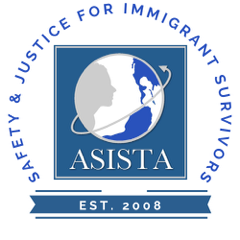Impact of Latest Executive Order on Survivor-based Forms of Immigration Benefits
by: Cecelia Friedman Levin, ASISTA Policy Director with Grace Huang, Policy Director, Asian Pacific Institute on Gender-based Violence
Yesterday, President Trump signed an executive order temporarily halting entry of certain individuals seeking to enter the U.S. on immigrant visas (as permanent residents) for 60 days. The order will be effective as of 11:59 pm ET on April 23, 2020.
The order covers ONLY those who are:
- outside the United States;
- do not have an immigrant visa that is valid as of 11:59 pm ET on April 23, 2020 and
- do not have an official travel document other than a visa (such as a transportation letter, an appropriate boarding foil, or an advance parole document) that is valid as of 11:59 pm ET on April 23, 2020 or issued on any date thereafter that permits him or her to travel to the United States and seek entry or admission.
The order lists the following categories as exemptions:
- Legal Permanent Residents;
- Spouses and minor children of U.S. citizens (those under 21), including prospective adoptees;
- Members of the U.S. military and their spouses and children;
- Medical health professionals seeking to assist with COVID-19 response or
- those coming to perform “work essential to combatting, recovering from or otherwise alleviating the effects of COVID-19 and their immediate relatives (spouses, unmarried children under 21). This designation will be determined by the Department of Homeland Security (DHS) and Department of State (DOS).
- Employment Based immigrant investors
- Afghani or Iraqi interpreters or others who have worked for US government
- Others designated by State Dept, DHS whose entry is in the national interest or whose entry would further important law enforcement objectives in the United States.
Who is impacted?
The executive order would cover the following categories of individuals seeking to enter the United States on an immigrant visa
- parents and adult children (over 21) of U.S. Citizens,
- spouses and children of green card holders;
- diversity visa applicants
- Most immigrant visas based on employment
These categories of individuals would not be able to obtain visas to enter for at least the 60 day period of the order. Even those family members who have a valid visa but do not also have a valid travel document would not be able to enter the United States unless they fall under one of the noted exceptions. The Migration Policy Institute estimates this order would block about 26,000 green cards a month or 52,000 over the 60 days of the proclamation. The impact of the executive order would be increasingly more significant if the Administration were to extend it beyond this initial 60 day period, and could impact over 350,000 green card cases per year.
With regard to survivor-based relief under the Violence Against Women Act (VAWA) or the Trafficking Victims Protection Act (TVPA), the following could be directly impacted by the order if they are abroad and seeking to enter the U.S under the following categories:
- An approved I-929 Petition for Qualifying Family Member for U-1 Nonimmigrant
- An approved VAWA self-petition based on abuse by a LPR spouse or parent
- An approved VAWA self-petition based on being an abused parent of an abusive U.S. Citizen son or daughter.
Who is not impacted by this order?
USCIS will continue to accept and process applications and petitions, and the executive order does not change that. Keep in mind that USCIS has temporarily suspended in-person services through at least May 3, 2020, including in-person interviews and biometrics processing, though the agency will provide emergency services for limited in-person situations. The executive order does not impact survivors who are applying for immigration benefits like VAWA self-petitions or for a U or T visa or other forms of adjustment of status that are currently inside the United States.
The executive order does not completely stop all immigration into the United States; it does not apply to those individuals who are abroad seeking to enter on nonimmigrant visas, this includes U and T visas, which are a nonimmigrant classification status. However, the executive order does contain instructions to DHS and the Department of Labor (DOL) to consult with DOS within the next 30 days to “review nonimmigrant programs” and make recommendations regarding how to “stimulate the United States economy and ensure the prioritization, hiring, and employment of United States workers.” So, it is likely that other forms of nonimmigrant status may come under additional review at a later date.
The U.S. Department of State has already suspended routine visa services worldwide and consulates are subject to local government restrictions. During the COVID-19 crisis, consulates are providing emergency and “mission critical” services, including for medical professionals, and H-2 visa holders. Thus under the current policy, It is unlikely that the consulates would be processing immigrant visas based on VAWA relief during the COVID-19 crisis unless it is emergency processing.
Bottom line:
As advocates, it is important to be messengers to survivors we serve to let them know that it is unlikely this executive order would impact the processing of applications like VAWA self-petitions, U and T visas if they are applying from here in the United States.
Please do reach out to ASISTA if you have any questions about this executive order and its impact on the survivors you serve. For technical assistance questions, please click here or contact questions@asisthelp.org
Additional resources:
